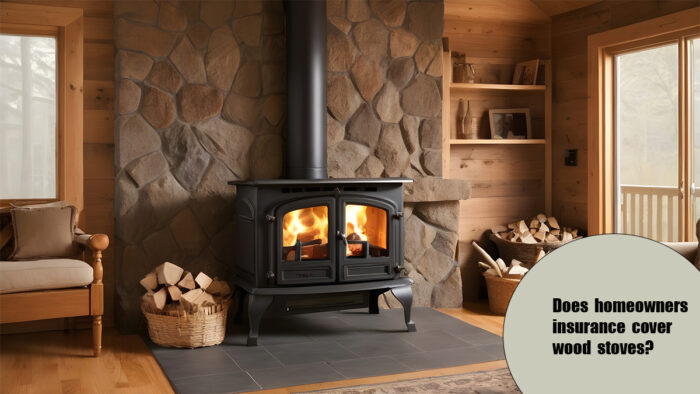During the winter, wood stoves are one of the best ways to keep warm. Especially in rural areas, homeowners in such areas use wood stoves as a source of heat in their homes. But nestled within the embrace of this comforting scene lies a question that often flickers in the minds of homeowners: Does homeowners insurance cover wood stoves?

According to the Environmental Protection Agency (EPA), wood stoves are responsible for over 4,000 fires per year. Hence, if you are using a wood stove in your home, you will likely pay more for home insurance than a person using an HVAC system.
Apart from this, many insurance companies provide wood-burning stoves, and if you reside in an area where the use of wood stoves is common, you will have no problem finding them. After all, if you meet the minimum requirements for safety and construction, I don’t see why you can’t receive coverage.
Does Homeowners Insurance Cover Wood Stoves?
Typically, homeowners insurance covers wood stoves or pellet stoves. However, you have to meet the conditions for coverage before you can get any form of coverage or protection. More importantly, the conditions you need to meet differ according to the insurance company or insurer, but they involve a safety check by a professional inspector and expert installation.
Apart from this, insurance providers are usually careful when offering such quotes to homeowners who need wood stoves as a source of heating. In other words, if wood stoves are going to be your only source of heat in your home, you will find it hard to get coverage.
What Type of Coverage Will I Get?
Homeowners insurance that offers wood stove coverage falls under the umbrella of your home insurance quote. Since a wood stove is involved, this may affect your coverage as well, so keep this in mind.
Here are the areas you will be receiving coverage for with a home insurance policy that covers wood stoves:
- Dwelling Coverage: Smoke or fire damage caused to your house.
- Liability Protection: If someone gets injured on your property.
- Personal Property Coverage: personal belongings, furniture, and electronics are protected and covered.
- Additional Living Expenses: If you need to leave your home because of damage that makes it inhabitable, you will get living expenses temporarily until your home has been fixed or repaired.
Insurance Requirements for Wood Burning Stoves
If your pellet stove or wood stove was installed professionally, the insurance company might offer you coverage. But if the insurance provider needs a professional contractor to install the wood stove, you will need to pay an additional fee for this service. On the contrary, if you install the stove on your own or if it was already installed when you bought the house, you will need to provide the necessary documentation for proof that the stove is safe and ready to use before the insurance company will agree with your coverage request.
The purpose of this process is to reduce the risks involved with the use of wood stoves, like carbon monoxide poisoning and fires. Therefore, when you follow this process, you will promote safety on your property and also get coverage with homeowners insurance.
Here are the important requirements for wood stoves:
- Professional installation
- Certification
- Inspection
- Approval
- Maintenance of chimney and ventilation
- Cleaning from combustibles
- Installation of smoke alarms and carbon monoxide detectors
- Discloure
- Safety and maintenance practices
Regular maintenance is essential for wood stoves, and if you can do all of these things on this list, you can guarantee the insurance company that you will not be a risky policyholder.
How to Get Home Insurance That Covers Wood Stoves
Without a doubt, getting a homeowners insurance policy that covers wood stoves in your home can be hard, but it is not impossible. Although there are several steps involved, you can follow them and successfully obtain coverage from any insurance provider. So, if you are interested, here are the steps you need to follow to go through this procedure:
- Review your current policy to find out if it covers wood stoves or if it doesn’t.
- Keep an eye out for certain exclusions related to fireplaces or wood stoves.
- If you buy a home with a wood stove or want to install one, notify your insurance company.
- Make sure that you follow safety rules and regulations.
- It is advisable to have your wood stove installed by a professional.
- Search around for insurance companies that offer coverage for this.
- Request for safety discounts.
- Feel free to consider additional coverage.
- Go through your policy thoroughly.
- Observe regular maintenance.
When you maintain your wood stove, you will find that its lifespan will be prolonged, and it will keep you in a safe zone. Follow these steps and ask your insurer if you can get a homeowners insurance policy that will cover wood stoves and feel protected when you use this source of heat.
FAQs
What factors influence whether my wood stove is covered by homeowners insurance?
Several factors may affect coverage, including the type of wood stove, its installation method, local building codes, and your insurance provider’s guidelines. Ensuring compliance with safety regulations and proper installation may impact coverage eligibility.
Are there any exclusions or limitations regarding wood stove coverage in homeowners insurance policies?
Exclusions or limitations related to wood stoves can vary among insurance providers. Common exclusions may include damage caused by lack of maintenance, improper installation, or certain types of wood stoves. Reviewing your policy and discussing specific concerns with your insurance agent can provide clarity.
Can I add coverage for my wood stove to my existing homeowners insurance policy?
Depending on your insurance provider and policy, you may have the option to add coverage for your wood stove through endorsements or riders. Discussing your needs with your insurance agent can help determine the best course of action to ensure adequate protection.
What steps should I take to ensure my wood stove is adequately covered by homeowners insurance?
To help safeguard your wood stove and ensure coverage under your homeowners insurance, consider maintaining regular maintenance, following installation guidelines, and keeping documentation of inspections and repairs. Additionally, consulting with your insurance provider can offer insights into any specific requirements or recommendations for coverage.



